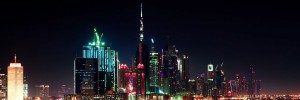By Carlin Gerbich www.constructionweekonline.com
It doesn’t take a structural engineer or a project consultant to work out that ambient temperatures in the GCC during the summer months are horrendous.

And, with modern building designs relying on a mix of large glass panels, large aluminium sheets and steel, external cladding and underlying insulation plays a huge part in ensuring occupants are able to live and work in relative comfort.
Calls for more thermally efficient designs have had a direct impact on demand for specialist cladding services. By ensuring that buildings are adequately sealed and free from thermal bridges, (where the ambient exterior temperature meets cool air inside a building, creating condensation) cladding specialists play an important role in helping to reduce a building’s operating costs.
“We’re at a bit of a crossroads in the way buildings are designed,” said Andy Dean, lead advisor, Facade Technology and Advisory Services at Al Futtaim Exova.
“In Dubai, there’s a cultural contradiction in the way we build currently, and how things were done historically. Traditional building designs included slots at ground level to let light in, which would reflect off the floor and illuminate the room.
Now, we build with a lot of floor to ceiling glass panels that let in a tremendous amount of heat and light – 15 times more than in the UK.
“But we’re seeing the start of a migration back to buildings that aren’t fully glazed here in the Middle East. That makes it a lot easier for designers to deal with heat build-up that comes from large glazed areas,” he said.
“Dual skin facades, while not new in Europe, are being pioneered by a few contractors in the UAE too. They control heat by creating an air-conditioned space between two layers of facade material. It works very well, and very efficiently,” Dean said.
Demand for cladding services throughout the UAE and GCC is on the rise after a difficult start to the year for some contractors.
Dubai-based Alumco, one of the UAE’s largest architectural facade specialists, says the effects of the global economic slowdown finally filtered through to its services this year but, with a number of high profile projects completed in Saudi Arabia and several more under development, Alumco’s activities outside Dubai have kept the company buoyant.
“Actually, 2009 was our best year, for glass at least,” said Alumco’s commercial manager, Glass Division, Ehab Haddadin.
“The start to this year has been quite slow but it has picked up and it seems we will have a busy two or three months ahead. Sales have been good, but margins are down. It’s not about making a lot of money this year – it’s just about getting through and making sure we’re still here when things turn around.”
Contracts with Saudi Arabia’s Princess Noura bint Abdul Rahman University for Women in Riyadh, and high profile projects include the Yas Marina Hotel with its 14,500m2 glass panels, the new Dusit Thani hotel and the Adnec Tower, for which Alumco supplied the glass canopies and panes for the link tower, plus its numerous other projects, have given the company enough to keep its factories running.
“We’re not at capacity, but we have enough to keep us going. The next two months should be better,” Haddadin said.
While there have been localised slow downs in the construction industry, some projects throughout the GCC continue to forge ahead at an encouraging rate.
Plan Abu Dhabi 2030 and its ambitious targets for several mega projects in the UAE capital has created lots of opportunities for contractors and suppliers.
Rapid expansion plans in Qatar and Saudi Arabia, coupled with a steady flow of projects from Kuwait, Sharjah and even Libya means cladding specialists are in demand.
Marlon Exner, general manager of Sharjah-based EJOT Middle East, said his company’s concentration on key projects during the recession meant it wasn’t affected by the economic slowdown.
EJOT specialises in high strength fasteners for steel, glass and aluminium fixing applications, covering “everything that you would need to secure the building envelope; the roofing, cladding, curtain wall and glazing.”
Their products can be found on the Burj Khalifa, Abu Dhabi’s Ferrari World and throughout the impressive King Abdullah University of Science and Technology in Saudi Arabia.
“Saudi Arabia, of course, is a very strong market for everyone, but Qatar is emerging as an important market. There are a lot of projects being worked on there, and there is a lot of potential for contractors,” he said.
“Dubai is still an important market for the cladding industry. It’s still a hot spot for key projects, and many of the construction industry’s bigger players are still based here,” Exner said.
While the construction industry had slowed down, Exner said that wasn’t necessarily a bad thing.
Clients, he said, were now interested in better value for their money – and if that meant paying a little more for a product that would outlast its rivals, they were willing to consider that as a real option.
“I think the focus is now on better quality and making sure that everything is done to a far higher standard,” he said.












